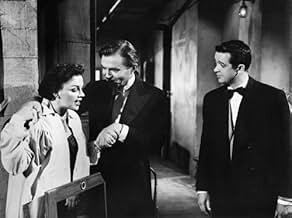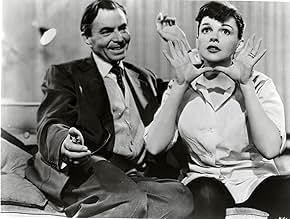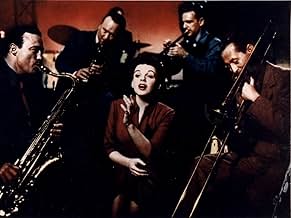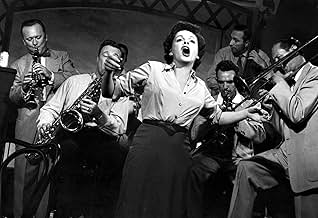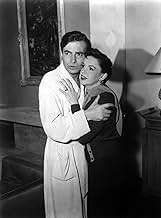VALUTAZIONE IMDb
7,5/10
20.417
LA TUA VALUTAZIONE
Una star del cinema aiuta una giovane cantante e attrice a trovare la fama, anche se l'età e l'alcolismo inviano la propria carriera in una spirale verso il basso.Una star del cinema aiuta una giovane cantante e attrice a trovare la fama, anche se l'età e l'alcolismo inviano la propria carriera in una spirale verso il basso.Una star del cinema aiuta una giovane cantante e attrice a trovare la fama, anche se l'età e l'alcolismo inviano la propria carriera in una spirale verso il basso.
- Regia
- Sceneggiatura
- Star
- Candidato a 6 Oscar
- 7 vittorie e 14 candidature totali
Tommy Noonan
- Danny McGuire
- (as Tom Noonan)
John Alban
- Academy Awards Attendee
- (non citato nei titoli originali)
Laurindo Almeida
- Guitarist
- (non citato nei titoli originali)
Leon Alton
- Usher
- (non citato nei titoli originali)
Rudolph Anders
- Mr. Ettinger
- (non citato nei titoli originali)
David Armstrong
- Soundman
- (non citato nei titoli originali)
Phil Arnold
- Agent #3
- (non citato nei titoli originali)
Nadine Ashdown
- Esther - Age 6
- (non citato nei titoli originali)
Gertrude Astor
- Racetrack Spectator
- (non citato nei titoli originali)
Recensioni in evidenza
This is a great film. Yes it is long. Yes some of the songs should have been cut but they weren't but we get a masterpiece anyway.
In this film Esther Blodgett is a talented aspiring singer with a band, and Norman Maine is a former matinee idol with a career in the early stages of decline. When he arrives intoxicated at a function at the Shrine Auditorium, the studio publicist attempts to keep him away from reporters. After an angry exchange, Norman rushes away and bursts onto a stage where an orchestra is performing. Esther takes him by the hand and pretends he is part of the act, thereby turning a potentially embarrassing and disruptive moment into an opportunity for the audience to greet Norman with applause.
Norman then takes Esther under his wing and gets her a screen test at the studio in which he works. She ends up homecoming a major star and his drinking escalates!
After the film was released Warner Brothers recalled the prints. 30 minutes were edited out. In 1983 Ron Haver was able to restore most of the film. Where he could not find footage for the missing scenes he used productions stills. People claim this halts the picture. It doesn't! Besides it only last a total of 7 minutes. It is not 7 minutes all at once!
Now in 2010 it was reported that film restorer Michael Arick had a print of this film. He will not let Warner Brothers use the print. Some people claim that he doesn't have a print however "He has never publicly denied it".
It is also Rumored that Tommy from Beverly Hills has hours of the films outtakes on VHS however it is silent footage. Maybe it might include the missing 7 minutes.
In this film Esther Blodgett is a talented aspiring singer with a band, and Norman Maine is a former matinee idol with a career in the early stages of decline. When he arrives intoxicated at a function at the Shrine Auditorium, the studio publicist attempts to keep him away from reporters. After an angry exchange, Norman rushes away and bursts onto a stage where an orchestra is performing. Esther takes him by the hand and pretends he is part of the act, thereby turning a potentially embarrassing and disruptive moment into an opportunity for the audience to greet Norman with applause.
Norman then takes Esther under his wing and gets her a screen test at the studio in which he works. She ends up homecoming a major star and his drinking escalates!
After the film was released Warner Brothers recalled the prints. 30 minutes were edited out. In 1983 Ron Haver was able to restore most of the film. Where he could not find footage for the missing scenes he used productions stills. People claim this halts the picture. It doesn't! Besides it only last a total of 7 minutes. It is not 7 minutes all at once!
Now in 2010 it was reported that film restorer Michael Arick had a print of this film. He will not let Warner Brothers use the print. Some people claim that he doesn't have a print however "He has never publicly denied it".
It is also Rumored that Tommy from Beverly Hills has hours of the films outtakes on VHS however it is silent footage. Maybe it might include the missing 7 minutes.
Who would have thought? Cukor, never having worked in colour before AND never having worked in widescreen before did the best piece of work of his career here. 'The Man That Got Away' is always considered one of the best musical numbers to come out of old Hollywood: but wait until you've seen it in widescreen. It's not even the same number, and you get why people who've seen this film in theatres revere the number. Some of the compositions (especially during the opening set piece) aren't just Cukor's best work, they rival anyone's from that era. Let me reitierate: see it in widescreen or trust those of us who have. This musical/ melodrama/tragedy set the bar so high that 50 years later people remember this film but not the musical that got a best picture nomination that year, OR, the performance that won Best Actress that year.
Is it possible to watch this fictional story without digressing to thoughts about the real life story of Judy Garland? For me it isn't. Both are permanently intertwined. And it's not just the parallel between fiction and fact, but also the dark, brooding, melancholy mood they engender, like ghosts calling out to us from a Hollywood that no longer exists.
The film's storyline is well known. I won't belabor it here, except to say that it communicates an honest and introspective indictment of the entertainment industry as it once was. The story can be thought of as a kind of archetypal Hollywood memoir, expressed as a musical.
But musicals are supposed to be upbeat, lighthearted, fun. This one isn't. Moments of humor and joy are swept away in a cascade of emotional pain and tragedy. Fiction mimics real life. How appropriate that the film's signature song "The Man That Got Away" is one that is so uncompromisingly serious, poignant, and smoldering ... a perfect vehicle for Judy Garland.
Some say she had the greatest singing voice of any entertainer in the twentieth century. This film lends credence to that assertion. Every song she sings is performed with such consummate verve, such emotional commitment that she seems to be singing not just for her contemporaries, but also for generations to come. Indeed, she is. My personal favorite is the "Born In A Trunk" segment, all fifteen minutes of it. Surrounded by sets of true cinematic art, she belts out one tune after another, including, of course, the poignant "Melancholy Baby".
Judy's singing and the music itself are what make the movie so memorable. But she also demonstrates her considerable acting talent. And the acting of other cast members is fine, especially the performances of James Mason and Jack Carson. I do think that the film was, and still is, too long, the result of an overly ambitious screenplay.
That Judy Garland was denied the Best Actress Oscar is poignant. But her talent was so massive, her uniqueness was so special, maybe fate required a compensatory level of pain and tragedy, as a prerequisite of legend.
The film's storyline is well known. I won't belabor it here, except to say that it communicates an honest and introspective indictment of the entertainment industry as it once was. The story can be thought of as a kind of archetypal Hollywood memoir, expressed as a musical.
But musicals are supposed to be upbeat, lighthearted, fun. This one isn't. Moments of humor and joy are swept away in a cascade of emotional pain and tragedy. Fiction mimics real life. How appropriate that the film's signature song "The Man That Got Away" is one that is so uncompromisingly serious, poignant, and smoldering ... a perfect vehicle for Judy Garland.
Some say she had the greatest singing voice of any entertainer in the twentieth century. This film lends credence to that assertion. Every song she sings is performed with such consummate verve, such emotional commitment that she seems to be singing not just for her contemporaries, but also for generations to come. Indeed, she is. My personal favorite is the "Born In A Trunk" segment, all fifteen minutes of it. Surrounded by sets of true cinematic art, she belts out one tune after another, including, of course, the poignant "Melancholy Baby".
Judy's singing and the music itself are what make the movie so memorable. But she also demonstrates her considerable acting talent. And the acting of other cast members is fine, especially the performances of James Mason and Jack Carson. I do think that the film was, and still is, too long, the result of an overly ambitious screenplay.
That Judy Garland was denied the Best Actress Oscar is poignant. But her talent was so massive, her uniqueness was so special, maybe fate required a compensatory level of pain and tragedy, as a prerequisite of legend.
On a brief getaway this past weekend, the hotel where I was staying had TCM (Turner Classic Movies) on its cable roster and, lo! and behold, there was Judy singing and acting her heart out in letterbox and stereo sound. TCM...you're the best!
It was the restored version, thank the good Lord, with that sad reminder of Warner Brothers' pathetic timidity in trashing Cukor's original cut, but recalling for us his masterful use of the widescreen ratio. (A "formatted" version would be simply unwatchable, what with numerous scenes played by actors perched on the outer reaches of the screen, opposite each other.)
James Mason turns in an absolutely brilliant performance, especially when one recalls the rigors of production, with filming going months over schedule, due to Judy's unhappy vicissitudes (so evident in her appearance even within the same scene!) With the very able support of Charles Bickford, as the most benign studio head ever, and Jack Carson proving why Warners kept him employed so often for so many years.
Plus musical direction taking fabulous advantage of Warners' studio orchestra (and WB's sound technicians who were, for several decades running, the envy of all the other major studios), and arrangements that must have overwhelmed first-run audiences with their incredible richness.
It's a must-see, all right, and is in a class by itself, among the several screen versions of this beloved Hollywood saga.
It was the restored version, thank the good Lord, with that sad reminder of Warner Brothers' pathetic timidity in trashing Cukor's original cut, but recalling for us his masterful use of the widescreen ratio. (A "formatted" version would be simply unwatchable, what with numerous scenes played by actors perched on the outer reaches of the screen, opposite each other.)
James Mason turns in an absolutely brilliant performance, especially when one recalls the rigors of production, with filming going months over schedule, due to Judy's unhappy vicissitudes (so evident in her appearance even within the same scene!) With the very able support of Charles Bickford, as the most benign studio head ever, and Jack Carson proving why Warners kept him employed so often for so many years.
Plus musical direction taking fabulous advantage of Warners' studio orchestra (and WB's sound technicians who were, for several decades running, the envy of all the other major studios), and arrangements that must have overwhelmed first-run audiences with their incredible richness.
It's a must-see, all right, and is in a class by itself, among the several screen versions of this beloved Hollywood saga.
Marked by a pervasive sense of melancholy, the 1954 musical version of the familiar Hollywood warhorse will forever be remembered as Judy Garland's most acclaimed work in films. Even though she would go on to a handful of films in the early 1960's, this was her last leading role in a major Hollywood production, an ironic point since she plays an emerging movie star on the rise. True, she doesn't look her best in the film, but her fulsome talent is on full, heart-wrenching display as Esther Blodgett, an obscure but thriving band singer who becomes movie star Vicki Lester thanks to Norman Maine, an alcoholic has-been movie star in career free-fall. Their love story and the opposing trajectories of their careers are tracked meticulously by Moss Hart's shrewdly observed screenplay and George Cukor's sensitive direction.
The double-sided 2000 DVD provides the 176-minute restored version, which is just five minutes less than what was shown at the original premiere. Until 1983, the half-hour of footage excised after the premiere was thought lost, but film historian Ron Haver found much of it and supervised an extraordinary restoration effort that includes a necessary albeit brief use of production stills to match up with the complete soundtrack. Even with such technicalities, the resulting film is even more of a landmark musical drama, emotionally resonant in spite of certain pacing issues with the storyline. Cukor's approach is probably more leisurely than the relatively hard-boiled material requires since he includes so many establishing and lengthy shots, but his direction shows his legendary sensitivity toward actors.
While he comes across a bit too robust as a fading matinée idol, James Mason vigorously captures Norman's scornful pride and self-pity. He may lack Fredric March's innate sense of vulnerability in the original, but Mason makes the character's inner torment more palpable. As for Garland, she brings so much of her own history to Esther/Vicki that her scenes feel alive with her vibrant, masochistic personality. She is aided immeasurably by the masterful songs of Harold Arlen and Ira Gershwin, most significantly her torchy rendition of "The Man That Got Away", as perfect a musical movie moment as has been ever produced. While her work in the fifteen-minute "Born in the Trunk" sequence is impressive, it is really later in the film when she soars, in particular, when she segues from the tap-happy "Lose That Long Face" into a breakdown scene in her dressing room with sympathetic studio head Oliver Niles portrayed with his typically stentorian fervor by Charles Bickford.
The print condition and sound quality on the DVD are superb. There are also some fascinating extras on the B-side starting with three alternative takes on "The Man That Got Away", each distinctive in presentation with costume and lighting changes, a must for Garland fans. Also included is a very brief deleted number within the "Born in the Trunk" sequence", "When My Sugar Walks Down the Street". Three vintage pieces have been gathered - a brief newsreel piece of the premiere, a four-minute clip of the Coconut Grove premiere party held after the premiere, and most interestingly, a half-hour kinescope akin to the current-day red carpet pre-shows with an amazing parade of period stars expressing little more than good wishes on their way to the theater. Lastly, the theatrical trailers for all three versions of "A Star Is Born" are also included.
The double-sided 2000 DVD provides the 176-minute restored version, which is just five minutes less than what was shown at the original premiere. Until 1983, the half-hour of footage excised after the premiere was thought lost, but film historian Ron Haver found much of it and supervised an extraordinary restoration effort that includes a necessary albeit brief use of production stills to match up with the complete soundtrack. Even with such technicalities, the resulting film is even more of a landmark musical drama, emotionally resonant in spite of certain pacing issues with the storyline. Cukor's approach is probably more leisurely than the relatively hard-boiled material requires since he includes so many establishing and lengthy shots, but his direction shows his legendary sensitivity toward actors.
While he comes across a bit too robust as a fading matinée idol, James Mason vigorously captures Norman's scornful pride and self-pity. He may lack Fredric March's innate sense of vulnerability in the original, but Mason makes the character's inner torment more palpable. As for Garland, she brings so much of her own history to Esther/Vicki that her scenes feel alive with her vibrant, masochistic personality. She is aided immeasurably by the masterful songs of Harold Arlen and Ira Gershwin, most significantly her torchy rendition of "The Man That Got Away", as perfect a musical movie moment as has been ever produced. While her work in the fifteen-minute "Born in the Trunk" sequence is impressive, it is really later in the film when she soars, in particular, when she segues from the tap-happy "Lose That Long Face" into a breakdown scene in her dressing room with sympathetic studio head Oliver Niles portrayed with his typically stentorian fervor by Charles Bickford.
The print condition and sound quality on the DVD are superb. There are also some fascinating extras on the B-side starting with three alternative takes on "The Man That Got Away", each distinctive in presentation with costume and lighting changes, a must for Garland fans. Also included is a very brief deleted number within the "Born in the Trunk" sequence", "When My Sugar Walks Down the Street". Three vintage pieces have been gathered - a brief newsreel piece of the premiere, a four-minute clip of the Coconut Grove premiere party held after the premiere, and most interestingly, a half-hour kinescope akin to the current-day red carpet pre-shows with an amazing parade of period stars expressing little more than good wishes on their way to the theater. Lastly, the theatrical trailers for all three versions of "A Star Is Born" are also included.
Lo sapevi?
- QuizGeorge Cukor offered Marlon Brando the role of Norman Maine on the set of Giulio Cesare (1953). "Why would you come to me?" asked Brando. "I'm in the prime of my life... If you're looking around for some actor to play an alcoholic has-been, he's sitting right over there"- pointing at his costar James Mason, who got the part.
- BlooperAfter Vicki comes home and she performs in her house for Norman, the doorbell rings and he goes to the door to accept a package for Vicki. His hair is all mussed-up when he goes to the door, but after he closes it and the camera goes back to him, there isn't a hair out of place. Then he walks over to where Vicki is and his hair is all mussed-up again.
- Citazioni
[last lines]
Vicki Lester: Hello, everybody. This is Mrs. Norman Maine.
- Versioni alternativeContrary to popular belief, the film was not originally at 181 minutes, but rather 196 (3hrs. and 16mins.) at a post-premiere shown on August 8, 1954 in Huntington Park, California. After its second post-premiere - the very next day - two scenes of 15 minutes total were deleted; making the film run its original world debut length at 181 minutes. One was a number called "When My Sugar Walks Down the Street" that came after Judy's take of "I'll Get By" in the 'Born in the Trunk' sequence, the other was a scene where Garland and James Mason's characters (Vicki and Norman) were picnicking on the beach; production stills and promotional advertisements are the only thing left in existence of the footage. After its world premiere on September 29, 1954, 27 minutes was cut, bringing it down to a mediocre 154 time length. Those scenes were:
- 1) Esther quitting the band
- 2) The Trinidad Coconut Oil Shampoo
- 3) Esther working at a drive-in
- 4) Norman being driven away drunk in his car
- 5) Norman inquiring Esther's old landlady
- 6) Spotting Esther on the TV commercial
- 7) Tracking down Esther at her new boarding residence
- 8) Driving down the strip - Esther getting sick
- 9) "Here's What I'm Here For" musical number - Norman proposes
- 10) "Lose That Long Face" musical number - Vicki breaks down
- ConnessioniFeatured in Film Night: Special: Forty Years in Hollywood (1970)
- Colonne sonoreGotta Have Me Go with You
(uncredited)
Music by Harold Arlen
Lyrics by Ira Gershwin
Performed by Judy Garland with Jack Harmon & Don McKay
I più visti
Accedi per valutare e creare un elenco di titoli salvati per ottenere consigli personalizzati
Dettagli
- Data di uscita
- Paese di origine
- Lingua
- Celebre anche come
- Nace una estrella
- Luoghi delle riprese
- Church of the Good Shepherd - 505 North Bedford Drive, Beverly Hills, California, Stati Uniti(Norman Maine's funeral)
- Azienda produttrice
- Vedi altri crediti dell’azienda su IMDbPro
Botteghino
- Budget
- 5.019.770 USD (previsto)
- Lordo Stati Uniti e Canada
- 4.335.968 USD
- Lordo in tutto il mondo
- 4.350.001 USD
- Tempo di esecuzione2 ore 34 minuti
- Proporzioni
- 2.55 : 1
Contribuisci a questa pagina
Suggerisci una modifica o aggiungi i contenuti mancanti









